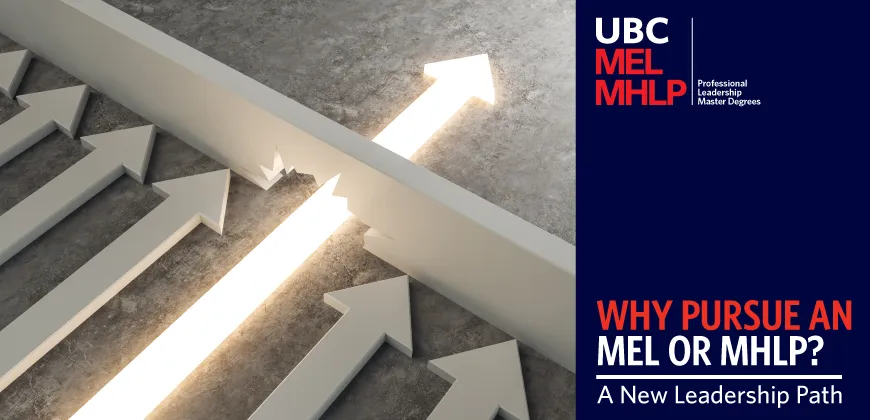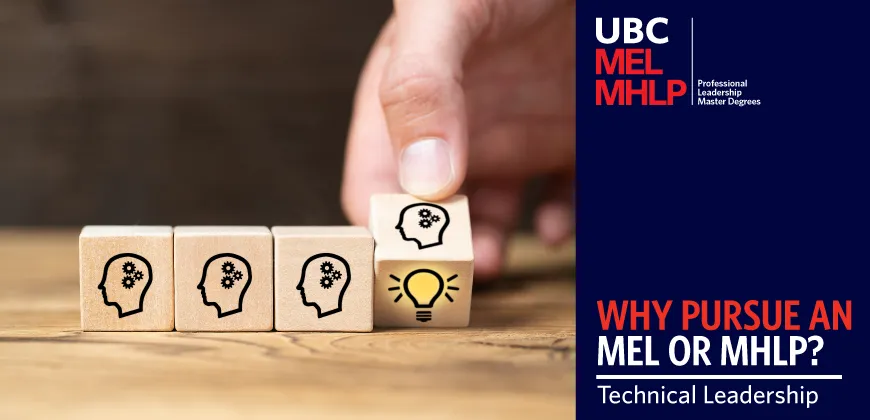A new path to a leadership position

You're respected in your workplace for your knowledge and skills. But you'd like a position with more responsibility – overseeing projects, managing budgets and teams, and developing strategy. Or perhaps you'd like to launch your own venture, bringing together your technical skills with knowledge of marketing, business development and accounting.
How do you make these goals a reality?
An interdisciplinary graduate degree – like the Master of Engineering Leadership (MEL) or Master of Health Leadership and Policy (MHLP) – is the answer for many professionals who want to move into leadership roles. That’s because the degrees combine specialized graduate courses in engineering or health care taught through the Faculty of Applied Science with business and leadership classes taught in partnership with UBC Sauder’s Robert H. Lee Graduate School. For Scott Greene, a 2019 graduate of the MEL in Dependable Software Systems, the innovative program offered the perfect balance of engineering and business.
“I wanted to keep my finger on the technical side, and that’s where the MEL came in. It fit right in the middle of the MEng and MBA programs I was considering.”
Gaining business and leadership skills
Depending on the MEL of MHLP program, between 30 and 50 percent of the curriculum consists of business and leadership courses. These classes can include Organizational Leadership, Strategy & Innovation, Analytics & Interpretation for Applied Sciences and Sustainability & Leadership. A three-week intensive Business Acumen for Technical Leaders class in the summer semester covers six core business competencies, from accounting and contract management to business case building and negotiations. Depending on the program, students can also take additional business electives through Sauder. Understanding business fundamentals is essential for professionals who want to move into management and leadership positions. Alex Chui came to the MHLP in Seniors Care in 2016 as an experienced Kinesiologist. He used the degree to pivot into a role in advocacy and policy development for the Alzheimer Society of BC before going on to lead quality and process improvement projects for Providence Health Care in Vancouver.
Alex says that the MHLP “provided some structure to my leadership strategy and development, and gave me an introduction to project management from which I have since expanded my skills.”
Dominique de Groot, a 2016 graduate of the Integrated Water Management program, says the MEL’s business courses have been invaluable in her work as a senior environmental specialist at Hatfield Consultants. Business development and relationship-building skills are critical in the world of consulting, and Dominique says the business and communication skills she developed through the MEL gave her confidence in her leadership roles.
“The business classes were instrumental,” adds Arlene Singh, a 2019 graduate of the MHLP in Clinical Education who is working as a Clinical Planner for virtual health initiatives at Vancouver Coastal Health. “Our exploration of change management theories and models has been very useful [in my position]. It’s helped me engage with staff and communicate the ‘why’ of what we are doing to support our patients.”
For these and other students, the skills and knowledge they acquired in their business courses gave them the credibility and confidence to step into positions of increased responsibility and leadership.
Thinking like an entrepreneur
A course like Creative Destruction Lab, an elective offered to MEL and MHLP students as well as UBC Sauder MBA students, is an excellent opportunity to gain first-hand business experience by working directly with emerging science and technology startups participating in the Creative Destruction Lab West accelerator program. Students work on everything from market analysis and customer segmentation to strategy development and financial analysis. Liam Russell, a 2019 graduate of the MEL in Advanced Materials Manufacturing, worked with a company developing technology for testing lithium batteries.
“I did an analysis of their market, the potential strategic beachheads and customers they should pursue. I also built out some calculations on what kinds of cost-savings their clients could expect from using this product.”
Some students participate in entrepreneurship@UBC, an extracurricular program that enables them to develop a business case for their potential service or product under the mentorship of industry leaders. In 2019, MEL in Clean Energy Engineering students Douglas Davila, Warren Boyle and Derek Oppedisano collaborated to develop a business case for plug-in solar energy panels. “We didn’t advance our idea, but we learned a lot about the concept and what it would take to make this a viable business,” says Douglas. Studying the language and tools of entrepreneurship benefits many MEL and MHLP graduates – whether they are starting their own company or developing a business case for an innovative idea within their organization.
Launching a new venture
Some alumni have used the knowledge and practical experience they gained in the program to start companies. After graduating in December 2017, Jennifer Johnson founded Solar Connect, a company that designs and installs solar energy systems to help homeowners become energy self-sufficient.
“I met some amazing engineers who definitely influenced my thinking,” says the MEL in Clean Energy Engineering graduate. “And I was also fortunate to connect with Cheryl Nelms, my professor for the project management for engineers course, who is now my mentor. She helped me realize I could start my own business. I strongly advise MEL students to seek out mentors and build professional relationships with them. It’s so helpful to connect with supportive people who have more experience and who can push you towards making your ideas a reality.”
Charting your new direction
In addition to gaining a solid foundation in business and leadership skills, the MEL or MHLP degree will enable you to deepen your knowledge of the latest advances in your industry. Each of the 9 specialty programs are in high-growth, high-demand areas, with courses taught by internationally respected researchers tackling some of the most pressing issues within their industry. These unique interdisciplinary degrees are relevant for professionals who want to be leaders in their fields. So whether you want to move into a higher-profile position with more responsibility or venture out on your own, the MEL and MHLP can get you there. With their unique combination of technical and business courses, the programs give you the skills and knowledge to lead with confidence, embrace new challenges and take your career to the next level.





